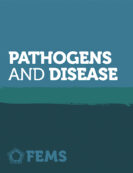microLife Poster Prize: Angélique Perret
We send our congratulations to Angélique Perret, who won the Best Poster Prize at The New Microbiology. This award is sponsored by our journal microLife.
The new microbiology, is an EMBO-FEBS lecture course that took place on 31 August – 8 September 2022, in Spetses, Greece. It covered different aspects of ‘the New Microbiology’, including bacterial diversity, microbial communities/microbiotas, symbiosis, biofilms, small RNAs or bacterial pathogens.
Read our interview with Angélique about her research below:

What is your current position, and what was your scientific journey to get there?
I am currently a second year PhD student in Thierry Soldati’s group at the University of Geneva (Switzerland). My project aims at investigating the role of the host membrane composition during Mycobacterium marinum infection in the social amoeba Dictyostelium discoideum and mammalian macrophages.
I started my university track with professional degrees in biotechnology for my bachelor 1 and 2 (Nîmes, France), and analytical and experimental biology for my bachelor 3 (Montpellier, France). After that, I integrated a master’s degree in environments-hosts-pathogens interactions at the University of Montpellier (France). My enthusiasm for infection biology emerged from all the internships I had the opportunity to performed during this whole journey.
Could you describe the research your poster covered?
At the New Microbiology EMBO / FEBS workshop I presented a work that is in collaboration with a previous Post-doc from our lab about the role of Vacuolin microdomains during M. marinum infection. We observed that vacuolins, protein organisers of the microdomains, and sterols, the main lipid components, are required for a successful M. marinum infection in D. discoideum. They both localised at the vacuole of the bacterium and their absence renders the cells more resistant to the infection. We also observed that both components have an additive effect and seems to act in an interdependent manner on the membranolytic activity of a major virulence factors of M. marinum. Interestingly, we have first evidence that this mechanism is also conserved during M. marinum infection in mammalian phagocytes.
What do you hope to focus your research on in the future?
For the rest of my PhD I want to continue to investigate the important role of the host membrane composition during the infection by functionally characterising other host and mycobacterial players and factors.
On the long term, I want to continue my research career in the field of host and pathogens interaction. I believe that all the different congresses and workshops will help me to build a strong baggage of knowledges and a collaborations network to help the field to progress.
–
We use income from the FEMS Journals to fund grants, awards, and projects, and to support our knowledge sharing events and initiatives. Consider publishing your research with our journals to help the global microbiology community.
All but one of the FEMS journals are fully open access (OA), with one journal, FEMS Microbiology Letters, offering free-to-publish and OA options. Open access is key to supporting the FEMS mission of disseminating high quality research as widely as possible: when high quality, peer reviewed sound science is open access, anyone, anywhere in the world with an internet connection, can read it.







